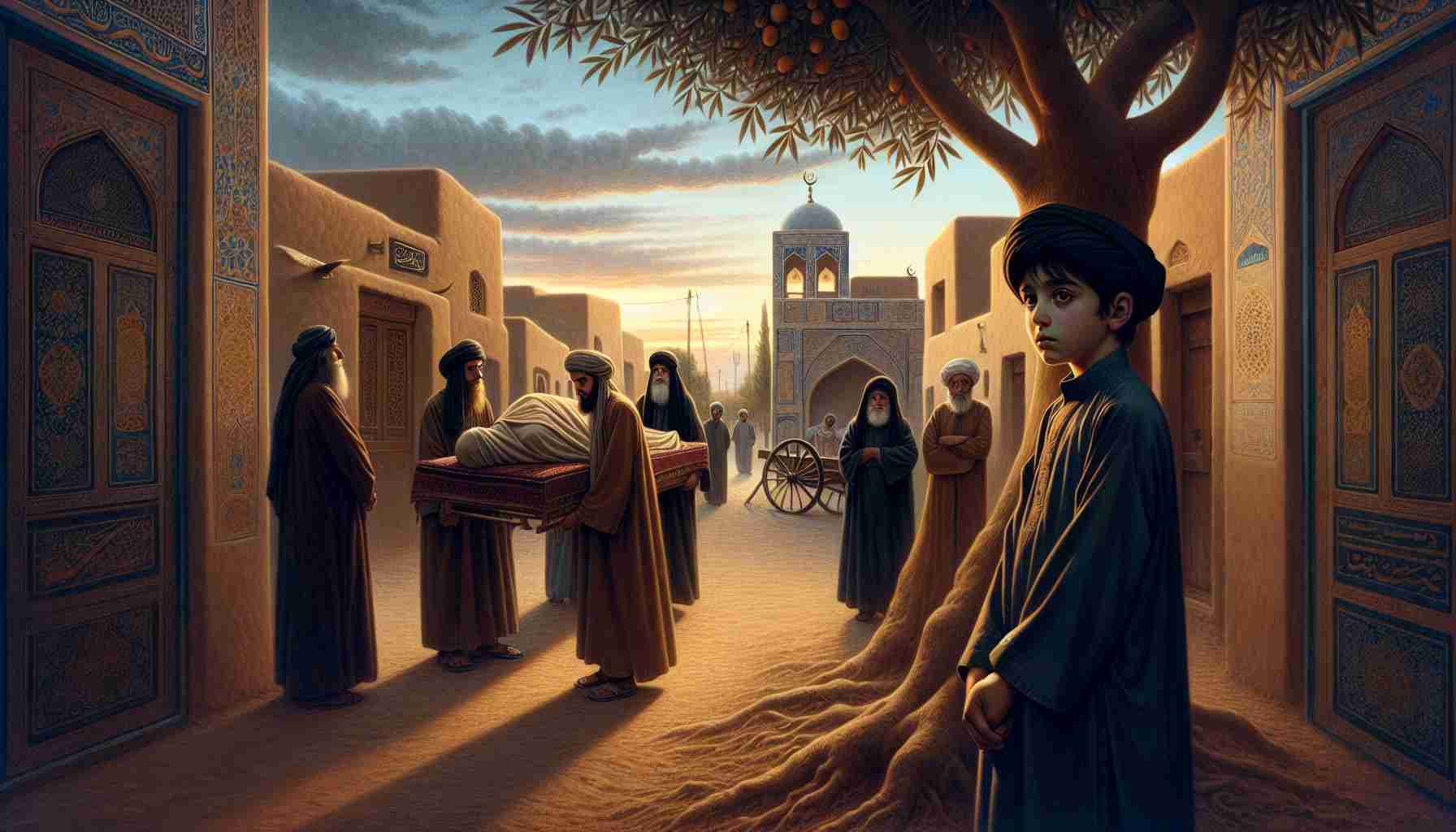

The call to prayer had just ended when the funeral passed our home.
I was sweeping the dusty path outside, like I always did after Fajr — the dawn prayer — when I heard the footsteps. They were slow, steady, filled with sorrow. A group of men walked by carrying a body wrapped in cloth on a wooden stretcher. I paused, my broom dangling in my hand. It was a Jewish funeral.
You won’t find my name in any surah — I was just a young boy in Madinah then, the city where Prophet Muhammad ﷺ had settled after leaving Mecca. My father, a tanner by trade, often reminded me to watch the Prophet’s ﷺ conduct. “You’ll learn more from his silence than ten men’s speeches,” he used to say.
That morning, I learned something I’ll never forget.
As the funeral passed, the Prophet ﷺ was seated in a gathering with his companions. I stood at a distance, hiding a little behind a date tree, just watching. Suddenly, he ﷺ stood up.
The companions looked confused. One asked, “O Messenger of Allah, he was a Jew.”
The Prophet ﷺ replied, “Was he not a soul?”
I felt my throat tighten. A soul. A human being. That’s what mattered most.
Our scholars tell us that this moment is preserved in authentic hadith — a teaching passed down from those who were there. It reminded even the closest companions that respect wasn’t only for Muslims, but for all the children of Adam.
It made me think of the way we, as kids, sometimes threw stones at the homes of Jewish families in Madinah. Not often — but when tempers rose, it happened. We saw them as different, as outsiders. But here stood our Prophet ﷺ, the best of mankind, rising in honor of someone whose beliefs were not his own.
That night, I told my father what I saw. He paused, placing his hand on my head, and said, “The Prophet ﷺ walks the path of all the prophets before him — Musa (Moses), Isa (Jesus), and Ibrahim (Abraham). All of them honored the truth, and all of them honored people.”
From that day, I kept my distance from mockery. I stopped laughing at the things others called strange. I began to greet our neighbors with a smile, Muslim or not. It wasn’t about agreeing with every belief. It was about treating others the way I would want to be treated.
Years later, I understood it even more deeply. Prophet Muhammad ﷺ wasn’t just teaching us how to pray or fast. He was teaching us how to live among others — with kindness, dignity, and mercy.
Because every soul matters.
And that day, as a child leaning on a tree trunk, I saw the truth rise — not in words, but in a simple act of respect.
Inspired by: Sahih Muslim, Hadith 961 (also referenced as Muslim 2329) – The Prophet ﷺ standing for a Jewish funeral.
The call to prayer had just ended when the funeral passed our home.
I was sweeping the dusty path outside, like I always did after Fajr — the dawn prayer — when I heard the footsteps. They were slow, steady, filled with sorrow. A group of men walked by carrying a body wrapped in cloth on a wooden stretcher. I paused, my broom dangling in my hand. It was a Jewish funeral.
You won’t find my name in any surah — I was just a young boy in Madinah then, the city where Prophet Muhammad ﷺ had settled after leaving Mecca. My father, a tanner by trade, often reminded me to watch the Prophet’s ﷺ conduct. “You’ll learn more from his silence than ten men’s speeches,” he used to say.
That morning, I learned something I’ll never forget.
As the funeral passed, the Prophet ﷺ was seated in a gathering with his companions. I stood at a distance, hiding a little behind a date tree, just watching. Suddenly, he ﷺ stood up.
The companions looked confused. One asked, “O Messenger of Allah, he was a Jew.”
The Prophet ﷺ replied, “Was he not a soul?”
I felt my throat tighten. A soul. A human being. That’s what mattered most.
Our scholars tell us that this moment is preserved in authentic hadith — a teaching passed down from those who were there. It reminded even the closest companions that respect wasn’t only for Muslims, but for all the children of Adam.
It made me think of the way we, as kids, sometimes threw stones at the homes of Jewish families in Madinah. Not often — but when tempers rose, it happened. We saw them as different, as outsiders. But here stood our Prophet ﷺ, the best of mankind, rising in honor of someone whose beliefs were not his own.
That night, I told my father what I saw. He paused, placing his hand on my head, and said, “The Prophet ﷺ walks the path of all the prophets before him — Musa (Moses), Isa (Jesus), and Ibrahim (Abraham). All of them honored the truth, and all of them honored people.”
From that day, I kept my distance from mockery. I stopped laughing at the things others called strange. I began to greet our neighbors with a smile, Muslim or not. It wasn’t about agreeing with every belief. It was about treating others the way I would want to be treated.
Years later, I understood it even more deeply. Prophet Muhammad ﷺ wasn’t just teaching us how to pray or fast. He was teaching us how to live among others — with kindness, dignity, and mercy.
Because every soul matters.
And that day, as a child leaning on a tree trunk, I saw the truth rise — not in words, but in a simple act of respect.
Inspired by: Sahih Muslim, Hadith 961 (also referenced as Muslim 2329) – The Prophet ﷺ standing for a Jewish funeral.